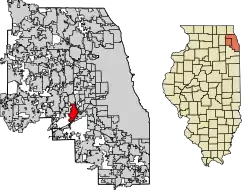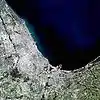Burr Ridge, Illinois
Burr Ridge (formerly Harvester) is a village in Cook and DuPage counties in the U.S. state of Illinois. Per the 2020 census, the population was 11,192.[3]
Burr Ridge, Illinois | |
|---|---|
Village | |
| Village of Burr Ridge | |
 Flag  logo | |
| Motto: "A Very Special Place" | |
 Location of Burr Ridge in DuPage County, Illinois. | |
| Coordinates ("): 41°45′11″N 87°55′12″W | |
| Country | |
| State | Illinois |
| Counties | DuPage, Cook |
| Townships | Downers Grove, Lyons |
| Incorporated | 1956 |
| Government | |
| • Type | Council–manager |
| • Mayor | Gary Grasso (R)[1] |
| Area | |
| • Total | 7.33 sq mi (18.99 km2) |
| • Land | 7.20 sq mi (18.64 km2) |
| • Water | 0.14 sq mi (0.35 km2) 1.96% |
| Elevation | 702 ft (214 m) |
| Population (2020) | |
| • Total | 11,192 |
| • Density | 1,554.88/sq mi (600.32/km2) |
| Standard of living (2007-11) | |
| • Per capita income | $81,192 |
| • Home value | $679,400 |
| ZIP code(s) | 60527 |
| Area code(s) | 630 and 331 |
| Geocode | 17-09980 |
| FIPS code | 17-09980 |
| Website | www |
Geography
Burr Ridge is located at 41°45′11″N 87°55′12″W (41.753030, -87.919998).[4]
According to the 2021 census gazetteer files, Burr Ridge has a total area of 7.29 square miles (18.88 km2), of which 7.16 square miles (18.54 km2) (or 98.15%) is land and 0.14 square miles (0.36 km2) (or 1.85%) is water.[5]
Burr Ridge lies in both Du Page and Cook counties. The village is bordered by Hinsdale to the north, Western Springs to the northeast, Indian Head Park to the east, Willow Springs to the south and southeast, and Willowbrook to the west, along with several unincorporated areas.
History
Burr Ridge's gently rolling hills were carved by glaciers at the end of the last ice age, and most of the village lies on the Valparaiso Moraine. Flagg Creek, a tributary of the Des Plaines River, runs through town.
Joseph Vial erected a log cabin near Wolf and Plainfield roads in 1834. Vial also ran a hotel on the stagecoach line, and the Vial family was actively involved in Lyons Township politics and the creation of the Lyonsville congregational church. The first Democratic convention in Cook County was held in Burr Ridge in 1835. After 1848, farmers shipped their goods to Chicago along the Illinois and Michigan Canal. A small settlement of German farmers also inhabited Flagg Creek by the 1880s.
In 1917, the International Harvester Company purchased 414 acres (1.7 km2) for an experimental farm, where it tested the world's first all-purpose tractor, the Farmall. Also in 1917, the Cook County Prison Farm (also known as the Bridewell Farm) began operation in what is now Burr Ridge.
In 1947, developer Robert Bartlett, whose company also developed Beverly Shores and Countryside, established the Hinsdale Countryside Estates out of a former pig farm. In 1956 these residents decided to incorporate as the village of Harvester, in honor of International Harvester.
In the 1940s, Denver Busby bought 190 acres (0.8 km2) that became known as the Burr Ridge dairy farm. He later launched the Burr Ridge Estates, with 5-acre (20,000 m2) home sites. In 1961, International Harvester and the Burr Ridges Estates merged with Harvester, changing the community's name to Burr Ridge. The town name is derived from a group of bur oak. By 1963, the population had more than doubled, to 790, and by 1975 it had soared to over 2,200.
In 1969, Chicago mayor Richard J. Daley suggested a proposal to build low-income subsidized housing on the prison farm property, but Republican-dominated DuPage County quashed the idea. The prison farm site became the Ambriance subdivision, a gated community of multimillion-dollar homes. The Four Pines Farm gave way to the Carriage Way subdivision, at whose entrance the original farmhouse still stands, and in 1971 additional farmland became the Braemoor neighborhood. An area known as Valley View, once owned by a Chicago industrialist and later by the Chicago chapter of the Boy Scouts of America, was developed in the early 1970s as the Burr Ridge Club. The village also has five corporate parks. As with other towns in the industrial corridor southwest of Chicago, close proximity to Interstates 294 and 55 spurred development in Burr Ridge.
Demographics
| Census | Pop. | Note | %± |
|---|---|---|---|
| 1960 | 299 | — | |
| 1970 | 1,637 | 447.5% | |
| 1980 | 3,838 | 134.5% | |
| 1990 | 7,669 | 99.8% | |
| 2000 | 10,408 | 35.7% | |
| 2010 | 10,559 | 1.5% | |
| 2020 | 11,192 | 6.0% | |
| U.S. Decennial Census[6] 2010[7] 2020[8] | |||
As of the 2020 census[9] there were 11,192 people, 4,278 households, and 3,194 families residing in the village. The population density was 1,534.83 inhabitants per square mile (592.60/km2). There were 4,562 housing units at an average density of 625.62 per square mile (241.55/km2). The racial makeup of the village was 74.42% White, 16.46% Asian, 1.96% African American, 0.16% Native American, 0.03% Pacific Islander, 1.22% from other races, and 5.76% from two or more races. Hispanic or Latino of any race were 5.44% of the population.
There were 4,278 households, out of which 26.0% had children under the age of 18 living with them, 66.29% were married couples living together, 6.76% had a female householder with no husband present, and 25.34% were non-families. 23.26% of all households were made up of individuals, and 13.58% had someone living alone who was 65 years of age or older. The average household size was 2.97 and the average family size was 2.50.
The village's age distribution consisted of 20.3% under the age of 18, 4.4% from 18 to 24, 13.7% from 25 to 44, 32.2% from 45 to 64, and 29.5% who were 65 years of age or older. The median age was 54.5 years. For every 100 females, there were 99.4 males. For every 100 females age 18 and over, there were 87.7 males.
The median income for a household in the village was $151,900, and the median income for a family was $204,167. Males had a median income of $115,272 versus $63,266 for females. The per capita income for the village was $97,295. About 1.1% of families and 3.3% of the population were below the poverty line, including 1.6% of those under age 18 and 2.8% of those age 65 or over.
| Race / Ethnicity | Pop 2010[7] | Pop 2020[8] | % 2010 | % 2020 |
|---|---|---|---|---|
| White alone (NH) | 8,167 | 8,212 | 77.35% | 73.37% |
| Black or African American alone (NH) | 207 | 208 | 1.96% | 1.86% |
| Native American or Alaska Native alone (NH) | 4 | 5 | 0.04% | 0.04% |
| Asian alone (NH) | 1,563 | 1,834 | 14.80% | 16.39% |
| Pacific Islander alone (NH) | 0 | 0 | 0.00% | 0.00% |
| Some Other Race alone (NH) | 21 | 27 | 0.20% | 0.24% |
| Mixed Race/Multi-Racial (NH) | 167 | 297 | 1.58% | 2.65% |
| Hispanic or Latino (any race) | 430 | 609 | 4.07% | 5.44% |
| Total | 10,559 | 11,192 | 100.00% | 100.00% |
Notable people
- Bo Jackson, former professional athlete in both baseball and football
- Jennifer Hudson, singer and actress
- Jim Peterik, member of the band Survivor; co-wrote "Eye of the Tiger"
- Dennis DeYoung, former lead singer of the band Styx
- Allison Rosati, WMAQ-TV weeknight anchor
- Derrick Rose, professional basketball player
- Bobby Simmons, professional basketball player
- Jim Thome, former major league baseball player and National Baseball Hall of Famer
- David Otunga, former WWE wrestler
Government and infrastructure
Burr Ridge is located in Illinois's 3rd congressional district, which has been represented by Democrat Marie Newman[10]
Burr Ridge is served by Pleasantview Fire Protection District (headquartered in LaGrange Highlands)[11] and Tri-State Fire Protection District (headquartered in Darien).[12] Tri-State Fire Protection District Station 3 is located on Madison Street in southern Burr Ridge.
Education
Primary schools
- Burr Ridge Community Consolidated School District 180 (Anne M. Jeans Elementary School, Burr Ridge Middle School)
- Gower School District 62 (Gower West Elementary School, Gower Middle School)
- Hinsdale School District 181 (Elm School, Hinsdale Middle School)
- Pleasantdale School District 107 (Pleasantdale Elementary School, Pleasantdale Middle School)
- Trinity Lutheran School
High schools
- Hinsdale Township High School District 86 (Hinsdale Central High School, Hinsdale South High School)
- Lyons Township High School District 204
Community colleges
- Community College District #502 (College of DuPage)
Parks
Burr Ridge includes 12 major parks. One of the largest parks, and home of the Burr Ridge Park District, is Harvester Park. Other larger parks include "Pleasantdale Park District" with adjacent Walker Park at 7425 S. Wolf Road in the Cook County portion of the Village. In DuPage County are Citizens Park, Kraml Park, Palisades Park, Stevens Park, and Whittaker Park in the south, Garywood Park and McCullough Park on Plainfield Road, and Oak Grove Park and Woods Pool Park in the north. [13]
Religious institutions
- St. Peter and St. Paul Orthodox Church
- Trinity Lutheran Church, a congregation of the Lutheran Church–Missouri Synod, organized on December 31, 1865. The church supports an elementary school with an enrollment of 137 students (as of 2007), founded in 1883, and is National Lutheran Schools Accredited (NLSA).
- St. Mark Coptic Orthodox Church, a congregation of the Coptic Orthodox Church of Alexandria (Egypt), was built in 1981 and was completed in 1983. The church conducts liturgies every Sunday and supports a Montessori pre-school.
- St. Helena's Episcopal Church of the Episcopal Diocese of Chicago was founded in the mid-1950s. The church supports multiple food ministries including a 24/7 food donation drop box and a partnership with Vacant 2 Vegetables, which provides fresh produce to area food banks with vegetables grown on the church's 5-acre site.
- Zoroastrian Center of Chicago, is one of the few Zoroastrian institutions in Illinois. It was founded in 1975 and is currently led by the Arbab Rustom Guive Darbe Mehr.[14]
References
- https://ballotpedia.org/Gary_Grasso
- "2020 U.S. Gazetteer Files". United States Census Bureau. Retrieved March 15, 2022.
- "Burr Ridge village, Illinois". United States Census Bureau. Retrieved April 15, 2022.
- "US Gazetteer files: 2010, 2000, and 1990". United States Census Bureau. February 12, 2011. Retrieved April 23, 2011.
- Bureau, US Census. "Gazetteer Files". Census.gov. Retrieved June 29, 2022.
- "Decennial Census of Population and Housing by Decades". US Census Bureau.
- "P2 HISPANIC OR LATINO, AND NOT HISPANIC OR LATINO BY RACE – 2010: DEC Redistricting Data (PL 94-171) – Burr Ridge village, Illinois". United States Census Bureau.
- "P2 HISPANIC OR LATINO, AND NOT HISPANIC OR LATINO BY RACE – 2020: DEC Redistricting Data (PL 94-171) – Burr Ridge village, Illinois". United States Census Bureau.
- "Explore Census Data". data.census.gov. Retrieved June 28, 2022.
- "Illinois 3rd Congressional District" Retrieved October 31, 2016
- "Pleasantview FPD". Archived from the original on September 27, 2013. Retrieved September 22, 2013.
- "Tri-State Fire Protection District". Retrieved September 22, 2013.
- "Burr Ridge Park District" Accessed October 30, 2016
- "History of The Zoroastrian Association of Metropolitan Chicago" Archived 2017-01-28 at the Wayback Machine Retrieved October 30, 2016
